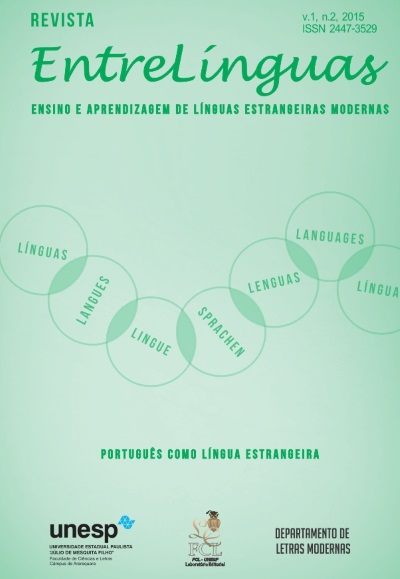The development of environmental awareness through a proposal for promoting intercomprehension in romance languages among high school seniors
DOI:
https://doi.org/10.29051/el.v1i2.8064Keywords:
Plurilingualism, Intercomprehension, Text genres, EnvironmentAbstract
This work aims to analyze the treatment of environmental issues in an educational proposal for Intercomprehension in Romance Languages (hereinafter called IC) developed by InterRom, a research team from Universidad Nacional de Córdoba, in Argentina. This proposal, aimed at developing high school seniors’ language skills from the perspective of teaching and learning IC from text genres, integrates pluralistic approaches to languages with contributions from socio-discursive interactionism (BRONCKART, 2007), from the sociocultural theory of human development (BRUNER, 1994; NELSON, 1996; ROGOFF, 1993; VYGOTSKY, 1962, 1988) and from cognitive approaches to text comprehension and production (BRITTON and GRAESSER, 1996; HAYES and FLOWERS, 1980, HAYES, 1996; SCARDAMALIA and BEREITER, 1992). Through the convergence of these theoretical perspectives, the proposal promotes IC in French, Italian, Spanish and Portuguese, related to environmental conservation, as well as actions for writing texts in Spanish. The planned language activities involve working with different text genres on environmental issues, such as the extinction of animal species, the production of genetically modified foods and the use of agrochemicals that contaminate the biosphere and threaten the life of all living species, including human beings. The exercises related to these topics, at the same time, encourage students to reflect on critical environmental issues and to develop strategies for writing texts in Spanish. To conclude, it can be argued that the IC proposal is based on social and intercultural approaches that integrate teaching actions, text production processes and science issues regarding the environment. As a result, students are regarded as subjects with competencies to understand discourses from different cultures and to think, write and act within their natural, social and cultural environments.
Downloads
Downloads
Published
How to Cite
Issue
Section
License
Os manuscritos aceitos e publicados são de propriedade da Revista EntreLínguas. Os artigos publicados e as referências citadas na Revista EntreLínguas são de inteira responsabilidade de seus autores.
Transferência de direitos autorais – autorização para publicação
Caso o artigo submetido seja aprovado para publicação, já fica acordado que o(s) autor(es) autoriza(m) a UNESP a reproduzi-lo e publicá-lo na EntreLínguas, entendendo-se os termos “reprodução” e “publicação” conforme definição respectivamente dos incisos VI e I do artigo 5° da Lei 9610/98. O artigo poderá ser acessado pela rede mundial de computadores (Internet), sendo permitidas, a título gratuito, a consulta e a reprodução de exemplar do artigo para uso próprio de quem a consulta, desde que haja a citação ao texto consultado. Essa autorização de publicação 328 EntreLínguas, Araraquara, v. 1, n .2, p. 323-328, jul./dez. 2015 não tem limitação de tempo, ficando a UNESP responsável pela manutenção da identificação do(s) autor(es) do artigo. Os artigos publicados e as referências citadas na Revista EntreLínguas são de inteira responsabilidade de seus autores.











